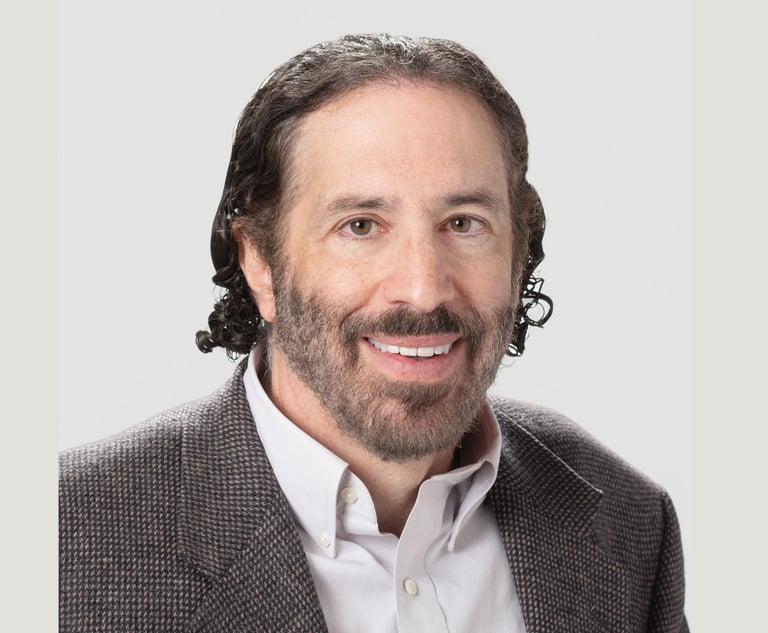Procedural Error Means Slander Suit Against Judge Lives—For Now
A slander suit by a Florida attorney against a Mercer County senior judge remains in play because the judge raised an immunity defense in the wrong filing.
March 08, 2018 at 12:40 PM
5 minute read

In a decision that found a three-judge panel of the Pennsylvania Superior Court in an internal debate over how far is too far when it comes to enforcing procedural rules, a slander suit by a Florida attorney against a Mercer County senior judge remains in play because the judge raised an immunity defense in the wrong filing.
The appeals court, ruling 2-1 to reverse a trial court decision tossing the case, said defendant Francis J. Fornelli, a senior judge on the Mercer County Court of Common Pleas, improperly raised his judicial immunity defense in preliminary objections, rather than in a new matter as required by Pennsylvania Rule of Civil Procedure 1030.
“Neither Judge Fornelli nor the trial court cite to a case from this court that explicitly allows a party to raise the affirmative defense of judicial immunity in preliminary objections merely because such a defense is clear from the face of the complaint,” Judge John T. Bender wrote for the majority. “In fact, our own cursory research has not yielded any such authority either. It has revealed, however, the inconsistency and uncertainty surrounding when parties may raise an affirmative defense in preliminary objections.”
Senior Judge John L. Musmanno joined in the result, but penned a separate, two-sentence concurring statement to note that he did so “reluctantly.”
“While the majority is procedurally correct, a remand in this case simply delays the inevitable, i.e., dismissal of the action based upon judicial immunity,” Musmanno said.
Judge Jacqueline O. Shogan, meanwhile, wrote a dissenting opinion, arguing that “such a hyper-technical interpretation of our procedural rules is neither compelled nor supported by current law and the facts of this case. ”
“
The underlying record establishes that Judge Fornelli is an active senior judge on the Mercer County Court of Commons Pleas who was appointed by the appropriate judicial authorities to mediate this case as part of his judicial duties, and our rules allowed the trial court to take notice of those facts in deciding the preliminary objections,” Shogan said.
According to the majority opinion, Tampa-based attorney Kurt Mitchell filed suit against Fornelli in Mercer County alleging the judge, just before presiding over a mediation proceeding, made slanderous comments about Mitchell to one of Mitchell's clients.
Fornelli filed preliminary objections in which he claimed judicial immunity and a Mercer County trial judge sustained those objections. Mitchell objected, arguing that it was procedurally improper to raise an affirmative defense in preliminary objections.
On appeal, Bender said the state Supreme Court ruled in the 1967 case Greenberg v. Aetna Insurance that the defendants could raise the affirmative defense of absolute privilege in preliminary objections where the complaint clearly showed the plaintiff had no right to relief.
But the high court contradicted itself in subsequent rulings, Bender added, leading the Superior Court to seek a middle ground.
“A review of the applicable case law indicates that this court has not embraced the practice of resolving immunity defenses through preliminary objections solely because such a defense is obvious from the face of the complaint,” Bender said. “Instead, this court has primarily relied on another limited exception to Rule 1030, allowing litigants to raise immunity defenses in preliminary objections where no objections to such procedure are lodged.”
Bender said that because Mitchell “specifically objected” to Fornelli raising an immunity defense in preliminary objections, the trial court was precluded from deciding the immunity question at that stage.
In response to Fornelli's argument that delaying a ruling on his immunity defense “'would serve no purpose,'” Bender cited language from the dissenting opinion in the 2014 Commonwealth Court case Feldman v. Hoffman, in which Senior Judge Dan Pellegrini wrote: “Just because it would be easier to decide it and 'end the matter' when the immunity issue is 'obvious on the face of the pleading,' then we are, in essence, converting an affirmative defense that
must be pled under [Rule] 1030 into a preliminary objection under [Rule] 1028, something we cannot do. When the Supreme Court promulgated [Rule] 1030 and made immunity an affirmative defense, it made the determination that a court would be better served in deciding that after there is a better delineation of the facts that results when an answer and new matter is filed.”
Bender also acknowledged in a footnote Mitchell's argument that a complete factual record needed to be developed before a trial court could determine whether Fornelli was acting within the scope of his duties when he made the allegedly slanderous comments, since the remarks came before the mediation proceeding actually commenced.
According to the footnote, Mitchell also raised the argument that the mediation proceeding itself was illegal, and therefore not a judicial act for which Fornelli would be entitled to immunity, because it pertained to fines imposed on Mitchell's client in a criminal matter arising from violations of the Pennsylvania Construction Code Act.
Mitchell, who represented himself in the case, said he was happy with the ruling.
“It was the correct decision and we'll go back down and continue litigating the case forward,” he said.
Fornelli is represented by Caroline P. Liebenguth of the Administrative Office of Pennsylvania Courts. An AOPC spokesman also could not be reached for comment.
This content has been archived. It is available through our partners, LexisNexis® and Bloomberg Law.
To view this content, please continue to their sites.
Not a Lexis Subscriber?
Subscribe Now
Not a Bloomberg Law Subscriber?
Subscribe Now
NOT FOR REPRINT
© 2025 ALM Global, LLC, All Rights Reserved. Request academic re-use from www.copyright.com. All other uses, submit a request to [email protected]. For more information visit Asset & Logo Licensing.
You Might Like
View All
Lackawanna County Lawyer Fails to Shake Legal Mal Claims Over Sex With Client
3 minute read
Pa. Superior Court Rules Pizza Chain Liable for Franchisee Driver's Crash
4 minute read
Patent Pending ... and Pending ... and Pending? Brace Yourself for Longer Waits
3 minute read
Boosting Litigation and Employee Benefits Practices, Two Am Law 100 Firms Grow in Pittsburgh
3 minute readTrending Stories
- 1'I Can't Do This': Judge Blocks $16M Alex Jones Settlement
- 2TikTok Opts Not to Take Section 230 Immunity Fight to U.S. Supreme Court
- 3Feasting, Pledging, and Wagering, Philly Attorneys Prepare for Super Bowl
- 4Special Section: 2025 Real Estate Trends
- 5Snap Paid $63M in Fees to 2 Am Law 200 Firms in '24
Who Got The Work
J. Brugh Lower of Gibbons has entered an appearance for industrial equipment supplier Devco Corporation in a pending trademark infringement lawsuit. The suit, accusing the defendant of selling knock-off Graco products, was filed Dec. 18 in New Jersey District Court by Rivkin Radler on behalf of Graco Inc. and Graco Minnesota. The case, assigned to U.S. District Judge Zahid N. Quraishi, is 3:24-cv-11294, Graco Inc. et al v. Devco Corporation.
Who Got The Work
Rebecca Maller-Stein and Kent A. Yalowitz of Arnold & Porter Kaye Scholer have entered their appearances for Hanaco Venture Capital and its executives, Lior Prosor and David Frankel, in a pending securities lawsuit. The action, filed on Dec. 24 in New York Southern District Court by Zell, Aron & Co. on behalf of Goldeneye Advisors, accuses the defendants of negligently and fraudulently managing the plaintiff's $1 million investment. The case, assigned to U.S. District Judge Vernon S. Broderick, is 1:24-cv-09918, Goldeneye Advisors, LLC v. Hanaco Venture Capital, Ltd. et al.
Who Got The Work
Attorneys from A&O Shearman has stepped in as defense counsel for Toronto-Dominion Bank and other defendants in a pending securities class action. The suit, filed Dec. 11 in New York Southern District Court by Bleichmar Fonti & Auld, accuses the defendants of concealing the bank's 'pervasive' deficiencies in regards to its compliance with the Bank Secrecy Act and the quality of its anti-money laundering controls. The case, assigned to U.S. District Judge Arun Subramanian, is 1:24-cv-09445, Gonzalez v. The Toronto-Dominion Bank et al.
Who Got The Work
Crown Castle International, a Pennsylvania company providing shared communications infrastructure, has turned to Luke D. Wolf of Gordon Rees Scully Mansukhani to fend off a pending breach-of-contract lawsuit. The court action, filed Nov. 25 in Michigan Eastern District Court by Hooper Hathaway PC on behalf of The Town Residences LLC, accuses Crown Castle of failing to transfer approximately $30,000 in utility payments from T-Mobile in breach of a roof-top lease and assignment agreement. The case, assigned to U.S. District Judge Susan K. Declercq, is 2:24-cv-13131, The Town Residences LLC v. T-Mobile US, Inc. et al.
Who Got The Work
Wilfred P. Coronato and Daniel M. Schwartz of McCarter & English have stepped in as defense counsel to Electrolux Home Products Inc. in a pending product liability lawsuit. The court action, filed Nov. 26 in New York Eastern District Court by Poulos Lopiccolo PC and Nagel Rice LLP on behalf of David Stern, alleges that the defendant's refrigerators’ drawers and shelving repeatedly break and fall apart within months after purchase. The case, assigned to U.S. District Judge Joan M. Azrack, is 2:24-cv-08204, Stern v. Electrolux Home Products, Inc.
Featured Firms
Law Offices of Gary Martin Hays & Associates, P.C.
(470) 294-1674
Law Offices of Mark E. Salomone
(857) 444-6468
Smith & Hassler
(713) 739-1250





